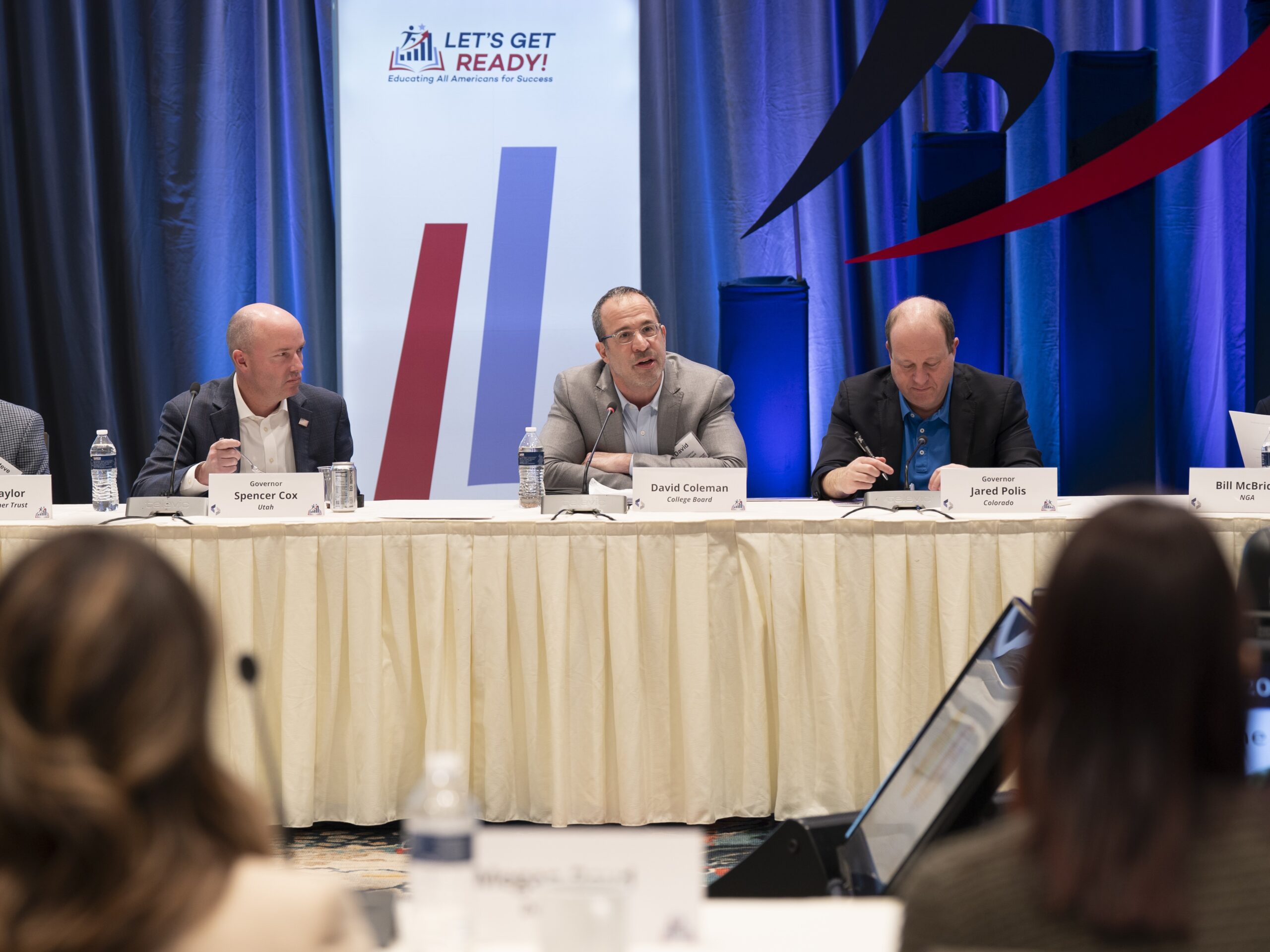Mr. Chairman.
On behalf of the National Governors Association (NGA), I want to express appreciation to you and ranking member, Senator Dodd, for your continuous work on behalf of the nation’s children and families. During the past year, you and this subcommittee have been in the forefront of developing policies to assist our nation’s most precious resource – our children. This hearing today continues your commitment.
We are brought together today by your continued interest in families and children, especially those who are separated because of a call to military duty. As you are aware, more than 40 percent of the men and women on active duty participating in Operation Iraqi Freedom, Operation Enduring Freedom, Operation Noble Eagle, and other overseas military operations, are members of the National Guard and Reserves. The dual mission of the Guard, which is supported by the nation’s Governors, means that they are ready and available for national defense when called by the President; and are available at the Governors’ command to assist the citizens of the states and territories, should the need arise.
The nation’s Governors have historically been very supportive of the National Guard whenever they have been called up by the President for national defense purposes. States enforce the Uniformed Services Employment and Reemployment Rights Act (USERRA) that was enacted by Congress to:
- Prohibit discrimination against National Guard and Reserve service;
- Ensure continued medical, dental and vision benefits by employers;
- Ensure participation in employer pensions, thrift savings, and stock options – even during military duty; and
- Permit Guard and Reserve members to file a claim against the employer if USERRA rights are violated.
States have also incorporated benefits suggested by the State Soldiers and Sailor Civil Relief Act. However, most states and Governors have gone far beyond these rights. Each time that there has been a major mobilization of National Guard members, there has been a major response by Governors and their states to support these men and women and their families with services and benefits. For example, during the Gulf War, the Guard call-up after September 11, and the current Iraq War, Alabama has implemented Operation Family Shield, a program where the State Board of Education refunds tuition to Alabama military personnel called to active duty. Currently, five counties in Florida forgive the property tax of military persons while deployed, and offer a one-time grant of $600 to renters who are deployed.
In the wake of the September 11 attacks, Governors expanded the use of the National Guard in homeland defense and security. During this period, Guard activities included securing strategic facilities such as airports, pharmaceutical labs, nuclear power plants, communications towers, and border closings. They also have been a cornerstone in protecting our citizens from domestic terrorism. While the Guard men and women were providing protection for our homeland, states began to provide and expand benefits for them and their families.
Given the number of National Guard men and women who have been deployed in the current war effort, the focus of my testimony is on programs, benefits, and services offered by the states in support of these Guardsmen and women and their families. The NGA Chair and Vice Chair recently wrote to Governors asking them about the benefits and services they were providing National Guard men and women in military service and their families. I have attached a chart that lists the benefits and services each state is providing.
Let me say at the outset that some of the benefits offered by states apply to both regular military service members and families, and some apply only to the members of the National Guard and their families.
Benefits Currently Provided by States
The benefits currently provided by states can be divided into six categories.
- Family support
- Educational benefits
- Licensing and registration benefits
- Tax and financial benefit
- State employees benefits
- Other support and benefits
Family Support. I will first focus on the family support services states are providing the families and children of Guardsmen and women and regular military families who have been called to active duty. According to the NGA survey, approximately 47 states are offering various programs and benefits to families including: extending hiring preferences for state jobs to spouses of military personnel; giving credit counseling to spouses and family members; offering family survivor benefit plans similar to state veterans cemetery benefits; providing rosters of volunteers who will assist with family needs and organizing family support groups; and giving free Internet service at public libraries. Forty states offer information about family benefits and support programs on their Web site.
As a specific example, the State of Washington has established the Washington National Guard Family Support Program that uses volunteers to keep families informed about benefits and other issues that spouses and families need while family members are on active duty. The Guard in Washington has published two documents that are available on their Website to assist families in planning and obtaining assistance. One of the documents provides guidance on planning real estate, wills, and powers of Attorney; the other document is designed to prepare families of Washington National Guardsmen and women to reunite upon returning from deployment. Many other states, including Minnesota, Nebraska, New York, and North Carolina have similar programs that offer assistance to children and family members of Guardsmen and women who have been called to active duty. Nebraska has organized monthly emotional support group meetings throughout the state (113 to date) that are sponsored by the Chaplain Corps for the families of active Nebraska National Guard soldiers. In addition, the Governor of Nebraska has hosted a series of picnics across the state for the families of deployed soldiers. In North Carolina, Project Community Action Readiness provides emergency vehicle and home repair, child care assistance, and transportation for military families.
The First Lady of Minnesota spearheads the Military Family Care Initiative to link military families with organizations and individuals willing to help them while their family members are deployed overseas. She encourages service organizations, community organizations, and faith-based groups to volunteer their services to families of military personnel through her state Web site. Families of military personnel who have been deployed can log on the site to search for groups near their homes that are willing to help with routine tasks, such as mowing the lawn or preparing a meal.
Education Benefits. A growing number of states are providing educational benefits. Overall approximately 35 states are offering some type of educational benefits to members of the Guard and their families as well as other military families, including tuition assistance, refunds and reimbursement when activated; scholarships for spouses and children; and special recognition and support to families whose member died in the line of duty. For example, Connecticut requires the state’s public colleges and universities to waive tuition for wartime veterans who have been accepted at an approved institution. The waiver applies at community-technical colleges, Connecticut State University, and the University of Connecticut; and covers credit-bearing undergraduate and graduate programs. In addition, Nebraska provides tuition assistance for the spouse or children of any member of the Nebraska National Guard who dies while serving in the active service of the state. And high school seniors of military families who transfer to school systems in Florida are exempt from exit exams, and may substitute the SAT or ACT.
Licensing and Registration Benefits. Approximately 24 states extend or waive deadlines for professional license and drivers license renewals, and exempt or extend deadlines for certain tax liabilities for Guardsmen and women who have been called to active duty. A statute in Maine says the state-authorized authorities who license and regulate any profession or occupation can waive or defer all or any portion of any continuing education requirement in current law as a condition of license renewal for a “person who is a member of the National Guard or Reserves under an order to active duty in support of an operational mission.” Likewise, New York provides that any professional license, certificate, or registration that expires while the holder is engaged in active military service shall be automatically extended for the period of active service plus 12 months after the end of service.
States are also streamlining requirements and joining mutual compacts for certain professional licenses in recognition of spouses of military families who transfer from state to state. For example, in 1998 the National Council of State Boards of Nursing (NCSBN) approved a policy goal to remove regulatory barriers to increase access to safe nursing care. The NCSBN began their mutual compact in January of 2000 with four states. Currently 20 states are part of the Nurse Licensure Compact.
Tax and Financial Benefits. Approximately 27 states offer some form of tax relief or extension of filing deadlines for the National Guard and Reserve members on active duty. Several states have no state income tax for Guard and Reserve members during the period they serve on active duty. A Connecticut statute requires towns to provide a property tax exemption of at least $1,500 for war veterans and their surviving spouses. New York State permits localities, at their discretion, to extend the payment period for any tax owed on real property. Eligibility is limited to a person who has been ordered to active military duty for a period beginning with a declaration of war by Congress, or during any period of combat designated by presidential executive order or while on hazardous duty. In addition, Nebraska provides an exemption from motor vehicle taxes to residents of another state that are living in Nebraska while serving on active military duty; and Missouri provides for an extension for state income tax or property tax on personal or real property for persons performing military service or their spouse when filing a combined tax return. Montana suspends property taxes for up to one year after cessation of hostilities or deactivation, and suspends the collection of income tax debts for up to six months after deactivation.
The Governors of some states are also encouraging stores and facilities to provide discounts to Guard members and their families. The Arizona Governor, in particular, has a list of “Governor’s Homeland Heroes,” which consists of businesses that are providing payment extension plans, financial contributions, services, and discounts to spouses and dependents of deployed members of the National Guard and Reserves. In North Carolina, bankers have donated $100,000 to extend childcare for military families. And New York has two programs under their Patriot Plan – the NY-USA Proud Employer of Distinction Award and the Patriot Support Discount Program – aimed at recognizing employers and retailers in the state who show extra support to members of the military.
State Employees Benefits. Twenty-five states give their state employees the difference between their regular pay and their National Guard pay when they are an active duty. Approximately 16 states provide health care and life insurance benefits for Guardsmen and women and their families. A few states offer assistance with private insurance. Nebraska reimburses National Guard members for up to 102 percent of costs incurred for employer-provided or personally held health insurance during any period of activation; Pennsylvania requires employers to provide health insurance and other benefits for the first 30 days of activation; and Wyoming allows National Guard members to maintain their health insurance by paying the employer the cost that would come from compensation.
Other Support Benefits. New York State and some other states offer various benefits and programs to military personnel and their families. In New York, the “Patriot Plan”, which is a package of benefits and protections for service members created by a Governor’s Executive Order and the state legislature, includes the following protections and benefits.
- Life insurance not to lapse for non-payment of premiums. Life insurance policies will not lapse for nonpayment of premiums for a period of two years following the period of active duty with the Armed Forces of the United States.
- Protection against enforcement of storage liens on household goods. Prohibits the foreclosure or enforcement of any lien for storage of household goods, furniture, or personal effects of a person in military service during such person’s period of active duty military service and for three months thereafter.
- Professional liability insurance protection. Professional liability insurance for persons ordered to active duty is suspended, upon request, for the period of military service plus 30 days.
- Prohibition against foreclosure of mortgage. Prohibits the sale, foreclosure, or seizure of property for nonpayment of mortgage during the service member’s period of service or within six months thereafter.
- Adverse Credit Reporting. Adverse action in future financial transactions including adverse credit reporting against an individual who has previously obtained a stay, postponement or suspension of obligations under the state Civil Relief Act, is prohibited.
- Termination of motor vehicle lease contract. Permits individuals who enter into a car lease prior to entering active military service to break the lease upon entry into active service.
- Maximum rate of interest. Extends the 6 percent interest cap on debt incurred prior to entering active duty.
- Suspension of repayment of public retirement system loans. Permits a public retirement system, at its discretion, to suspend the obligation to repay any loan while a member is absent on military duty.
Other states are:
- Providing health and life insurance coverage during activation;
- Giving cost of living pay increases while activated;
- Offering reemployment protection including seniority and pay upon returning from service;
- Giving veteran preference on exams for employment;
- Providing hiring preference for service connected disability;
- Protecting families from foreclosure during activation;
- Providing service men and women hiring preference for state, municipal and county employment; and
- Allowing the accrual of sick leave and vacation time while activated.
Mr. Chairman, North Carolina has even given assistance to their National Guard Members during deployment in Iraq. The state has supplied them hand held radios, body armor, and laptop computers.
NGA Assistance to States
In a significant number of policy areas NGA assists states in highlighting “best practices” of other states. Since Governors openly admit that they like to “borrow and steal” the best ideas of other Governors, this is an important role for NGA. Since so many states have expanded their benefits to the National Guard and Reserves, this is an area that lends itself to sharing of “best practices.” The information that I have provided was collected through the NGA survey. NGA intends to post the state-by-state listing on our Web site. The Web-site will be updated as more information is received from states.
We will also investigate those areas where implicit or explicit reciprocal action or agreements may be appropriate, especially relating to military families transferring to school in different states, military families receiving public assistance, and the process of obtaining professional licenses. Further, if a formal voluntary compact or memorandum of agreement may be appropriate we will also investigate these options. For example, states could agree to recognize professional licenses from other states during the term of service. The Nurse Licensure Compact is a good example. As mentioned earlier, this compact has been in operation for approximately four years and currently has 20 member states, and several other states are considering adopting the compact.
Mr. Chairman, currently there is an initiative in the Department of Defense (DoD) to examine benefits and services in states. NGA has been working with DoD in this effort and looks forward to a continued relationship. This is an opportunity for states to share information about programs and services that they are providing military personnel.
In summary, Mr. Chairman, Governors and their states have been stepping forward to assist families of men and women who have been called to active duty, both the regular military and National Guard and Reserves. State employees who are members of the Guard are receiving pay differentials while on active duty; children are receiving subsidized tuition in some cases; spouses are obtaining counseling and assistance with childcare and other needs; and the men and women on active duty are receiving tax breaks, as well as postponement or waiving of drivers and professional license renewal until they return from active duty.













